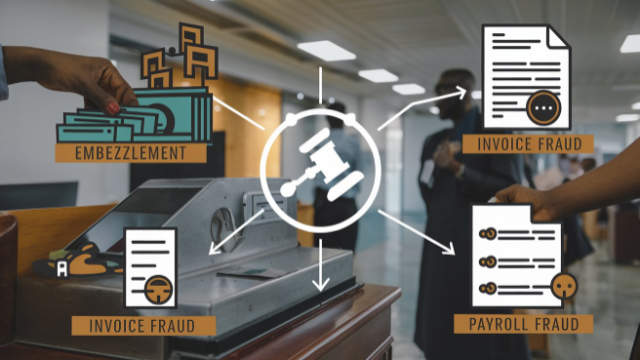Overview of Financial Frauds in Nigeria
Financial fraud is a pervasive issue in Nigeria, with various schemes and tactics employed by individuals and businesses to obtain economic gains illegally. These fraudulent practices have become increasingly prevalent, posing significant challenges to the Nigerian economy and corporate sector. The widespread existence of evasive entrepreneurship and a lack of adequate regulatory oversight have contributed to the prevalence of financial fraud in Nigeria. According to the Association of Certified Fraud Examiners (ACFE), organisations lose 5% of their revenue to fraud.
Types of Business Financial Frauds in Nigeria
Embezzlement
Embezzlement is wrongfully taken possession or conversion of someone else property, which has been lawfully entrusted to the perverted individual, and this is prevalent in white-collar crimes.
Embezzlement is a common form of financial fraud in Nigeria, where individuals in positions of trust within an organisation misappropriate funds for personal gain. The Financial Institutions Training Centre (FITC) reported that in the first quarter of 2024, fraud cases rose from 2.9 billion naira to 56.3 billion in the second quarter of the reporting year.
This can involve diversifying company funds, unauthorised use of corporate assets, or manipulating financial records to conceal the theft.
Invoice Fraud
Invoice fraud is a pervasive scheme among private and government institutions, particularly in Nigeria, where individuals or businesses create fictitious invoices or inflate the value of legitimate invoices to obtain improper payments. This fraud often involves collusion between employees, vendors, or suppliers to defraud the company.
Supply chain management in Nigeria is a serious area of concern as the investigation of the Global Fund program in 2021 revealed invoice fraud of over $3 million perpetrated by a subcontractor in Nigeria for the supply of and distribution of health care facilities.
This shows weak internal control systems resulting from poor corporate governance structures by various organisations involved in a lack of due diligence in the engagement of vendors before the award of such contracts and inadequate oversight in contract implementation.
Payroll Fraud
Payroll fraud is a significant issue in Nigerian businesses, where employees may create ghost employees or inflate the hours worked to receive unauthorised payments. Weak internal controls and inadequate oversight in the payroll process can facilitate this type of fraud.
The “Japa Syndrome” has also exposed the severe payroll fraud among various government institutions where civil servants who have left the shore of Nigeria for greener pastures abroad are still on the government’s payroll. Poor internal control systems and a lack of effective fraud detection mechanisms have allowed this fraudulent activity among government institutions.
Vendor Fraud Schemes
Fictitious vendor, collusion bidding, overbilling, kickbacks, and bribery are forms of vendor fraud that constitute a widespread problem in Nigeria, where businesses or individuals may collude with vendors to overcharge for goods or services, provide inferior products, or even create fictitious vendors to divert company funds. The government ministries, parastatals and private organisations are culpable of these forms of vendor fraud schemes in Nigeria.
Fundamental Causes of Financial Frauds in Nigerian Businesses

The widespread presence of financial fraud in Nigeria can be attributed to several critical factors, including the widespread practice of “Godfatherism,” which enables selective judgment and a lack of agency autonomy.
Additionally, political immunity and a lack of effective enforcement mechanisms have undermined public governance and the rule of law, making it challenging to combat fraudulent activities.
Impunity, particularly among politically exposed persons, has been a bane of financial fraud in Nigeria. The anti-graft agencies are sometimes helpless in prosecutions of high-profile cases in Nigeria.
The Impact of Financial Frauds on Nigerian Companies
The impact of financial fraud on Nigerian companies can be devastating, leading to significant economic losses, reputational damage, and an erosion of investor confidence.
Financial Losses: According to the Association of Certified Fraud Examiners (ACFE), organisations lose 5% of their revenue to fraud annually. Financial fraud has severe implications for Nigerian companies, particularly regarding financial losses.
In the second quarter of 2024 alone, Point of Sales (POS) and mobile fund-related fraud alone accounted for 42 billion naira, according to the AP Fraud Mitigation report, and this is primarily due to poor KYC implementation by the relevant regulatory bodies and the financial institutions in Nigeria.
- Corporate Fraud Case: The absence of practical fraud risk management principles has given rise to poor corporate culture and weak internal control systems in Nigeria, thus giving rise to corporate scandals in Nigeria.
The poor governance structure in Nigeria’s financial institutions, for instance, has led to the dissolution of boards of some banks in Nigeria and the recent position of the Economic and Financial Crime Commission (EFCC) in beaming its searchlight on the management of bank executive indicate poor tone at the top and lack of effective fraud risk management in place.
- Fraudulent Activities in the Banking Sector: AP Fraud Mitigation Report reported that Nigeria’s banking sector reported over 3 billion naira in fraud in the first quarter of 2024. This has severe implications for the industry, eroding customers’ confidence in the financial sector.
- Economic Implications: The magnitude of financial crime in any economy has adverse consequences on such economy, as investors cannot guarantee the safety of their investment in such jurisdictions, especially where the enforcement agencies embark on selective prosecution and lack diligent prosecution where the chain of custody is not legally obtained, and enforcement agencies staff are not adequately trained in criminal investigations matters.
Strategies to Mitigate Financial Frauds in Nigeria
A multifaceted approach is necessary to mitigate the prevalence of financial fraud in Nigeria. This includes strengthening internal controls, enhancing transparency, and improving the capacity of regulatory agencies to detect and prosecute financial crimes.
Effective Regulatory Measures: The regulatory body must implement effective regulatory frameworks to prevent various forms of fraudulent activities that aid financial fraud in the country.
This is highly imperative among the POS operators, and the proliferation of POS operators is very concerning, especially where commercial banks have abdicated their responsibilities to these operators at the expense of members of the communities, especially where the citizens are charged outrageously by these operators.
The Deployment of Technologies: Organisations can leverage artificial intelligence (AI) and machine learning (ML) to detect suspicious transactions and have prescriptive tendencies of temporarily denying such transactions until further investigations are made to forestall financial losses.
.
Adoption of Blockchain Technology: The distributive nature of blockchain technology reduces the incidence of financial fraud. This helps in traction transactions on a real-time basis and provides enhanced security.
Fraud Risk Management Principles: Fraud risk management ensures that organisations establish effective corporate governance structures, holding the board and senior management accountable for setting the right tone at the top and implementing robust internal control systems to prevent, deter, and detect fraud.
Political Will by Government: The Government must demonstrate a strong commitment to addressing financial crime by thoroughly addressing related issues. Any legal provisions that enable impunity should be amended where necessary. Consequently, the presidential pardon granted to convicted governors in Nigeria undermines the efforts of the anti-graft agency in crime prosecutions and is a waste of taxpayers’ money. It also indicates that the government only pays lip service in the fight against economic and financial crimes.
Diligence Prosecution: Prosecution bodies, such as the Police, EFCC, and ICPC, must meet expectations by demonstrating professionalism in crime investigations rather than resorting to media trials without diligent prosecution. This ensures that perpetrators do not evade justice.
Conclusion
There is a need to review the laws that set up anti-graft agencies to guarantee their independence from political interference so that these institutions can achieve the objectives they are set up for.
Furthermore, the judicial arm must complement the efforts of these bodies for them to be successful, notably the Nigeria Bar Association (NBA), which has a significant role in ensuring that its members act according to the profession’s ethics while representing the suspected fraudsters.
They act with integrity and a good conscience and think of the overall good of the nation as against their benefits.
Financial fraud remains a persistent challenge in the Nigerian business landscape, with various schemes and tactics employed by individuals and organisations to obtain economic gains illegally.
Addressing this issue will require a concerted effort from the public and private sectors to improve governance, enhance regulatory oversight, and foster a culture of ethical business practices.



